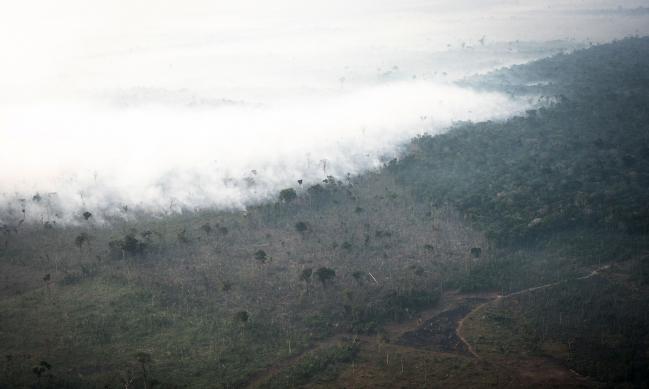Procore stock price target raised to $90 from Goldman Sachs on stabilizing growth
(Bloomberg) -- Brazilian farmers suspected of setting thousands of fires in the rainforest could instead find themselves being paid to preserve trees rather than burn them down—with money from California.
A vote next month by the California Air Resources Board, or CARB, would enact guidelines for national or local governments in tropical countries who want to build markets for CO2 emission credits generated by forest protection. The credits are known as “offsets” and can be sold to companies as a way to counterbalance a portion of greenhouse-gas emissions through payments rather than reducing pollution itself. The California regulatory effort has been in the making for more than decade. Previous innovations by the powerful state agency in 1966 set up the first tailpipe standards emissions standards and last month clinched an environmental deal with major carmakers.
If passed, the California Tropical Forest Standard would create a set of best practices for keeping forests intact and scrubbing CO2 from the atmosphere. Tropical governments that adopt CARB’s forest-protection standards, which include partnerships with indigenous groups and independent verification, would be able to link up with cap-and-trade markets that subscribe to California’s standard.
California’s economic standing and sophistication in climate policy “make it a part of the solution to this current fire crisis” in Brazil, said Daniel Nepstad, executive director and senior scientist at the Earth Innovation Institute, a research nonprofit focused on sustainable tropical development.
The problem is that much of the Amazon (NASDAQ:AMZN) is currently worth more dead than alive. There are markets for beef, soybeans and everything else Brazil produces. These markets are so alluring that there’s every incentive to knock down trees to satisfy them. There is no equivalent market to keep trees standing.
The Amazon (NASDAQ:AMZN) is the world’s largest rainforest, responsible for drawing in enormous quantities of airborne carbon dioxide, which it fixes into wood and living tissue. Deforestation doesn’t just remove trees from the ecosystem—the cleared land hosts agriculture, which further increases CO2 emissions. Thomas Lovejoy, a professor at George Mason University, recently warned that the Amazon is approaching an “ecological tipping point,” after which the rainforest’s water cycle and web of life can no longer sustain themselves.
Companies currently regulated under the California’s cap-and-trade system can only buy offsets generated in the U.S. As of this moment, California’s program draws offsets from avoided emissions in the U.S. forestry, livestock, mining and chemicals sectors, allowing participants who protect trees or limit methane emissions from mines to sell credits in the marketplace. Beneficiaries include several Native American tribes who generate carbon credits from forest management. Credits can be sold to companies that generate emissions and must comply with the program, a group that includes Chevron Corp. (NYSE:CVX), PG&E Corp. and Tesoro Refining & Marketing Co.
Offsetting programs struggled for years as officials tried to address known flaws in their design. What happens if protected forests end up burning down unintentionally? The California plan tries to deal with this problem by holding a small reserve of offsets that it can use to insure against it. What’s to prevent loggers from avoiding protections by moving to nearby, unprotected forest? Unlike a UN-backed offsetting program from 15 years ago that accredited small projects, the California standard would authorize entire territories to generate offsets—states or nations—so that loggers can’t just move on to properties adjacent to a restricted area.
It’s far easier today to monitor deforestation and verify improvements than it was a decade ago, thanks to more and better satellite technology. Institutions from Brazil’s National Institute for Space Research to private U.S. weather service providers draw in data from NASA’s MODIS imagers on the agency’s Aqua and Terra satellites. Planet Labs Inc., a closely held San Francisco satellite company, collaborates with universities, foundations and other tech companies in an effort known as MapBiomas, which delivers fast, high-quality data on Brazilian forests. This all makes it harder for fire-starters to hide.
California alone can’t stop Brazil’s fires and deforestation. Regulated companies in the state can only use offsets to neutralize up to 8% of their emissions, a figure that declines to 4% in 2021. Everything else must come through direct cuts. The percentage of allowable offsets is a controversial number in environmental policy. Activists want zero or little substitution for direct emission cuts, while companies push for ways to comply with minimal expense.
CARB’s program is likely to influence offset programs far beyond the state’s borders. The policy could bring rigor to the monitoring and verification of forest safeguards and increase confidence in markets for financing and purchasing emission credits. The international aviation industry, for example, may see the state standard as an attractive model for its own climate work, according to a CARB background document, and the proposed methodology could inform sustainable supply-chain initiatives. Just having a rigorous and transparent way to measure, monitor and verify forest protections could be more valuable than generating offsets.
PG&E, the public utility in California that was forced into bankruptcy by wildfire losses earlier this year, supports CARB’s proposed standard. The company is expected this week to submit another letter reiterating its support for the standard. “PG&E supports a robust offsets market as a way to achieve emission reductions,” Jessica Melton, PG&E’s representative for state agency relations, wrote last fall.
Even the most effectively designed and shrewdly implemented policy can’t overcome political opposition. Brazilian President Jair Bolsonaro this week rejected foreign aid to help protect the Amazon (NASDAQ:AMZN) from fires, leaving in doubt whether his government would embrace an emissions-credit regime set up by regulators in Sacramento.
